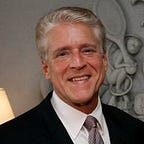Ted Leonsis & Adam Silver on Basketball, Journalism and Sports’ Power to Unify
Ted Leonsis and National Basketball Association (NBA) Commissioner AdamSilver are two of the most far-reaching intellects and incisive observers in sports, business and popular culture. On November 17th, the University of Maryland’s Merrill School of Journalism held its annual Povich Symposium featuring Leonsis and Silver, moderated by alumnus and SBJ ace journalist John Ourand. It’s a sports maxim that talent drives outcomes, and that fit yesterday’s discussion. Here are some points to ponder:
· Ted opined that current sports journalism is great, but the media companies that house journalists are being left behind. Leonsis said that big media companies don’t have growth mindsets, from strategy down to infrastructure, pointing to the RSN he bought from NBC, where the TV cameras were 22-years old.
· Ted talked about that purchase, saying “I didn’t buy an RSN; I properly valued the game rights for our teams, and wanted to control the distribution of that asset.”
· Commissioner Silver noted that live sports constituted the top-rated content for every TV network. He noted that, as the last appointment viewing in an atomized world of endless choice, sports’ inherent advantage and the NBA’s relentless strategy of global expansion, product improvement, risk-taking and demographic appeal will position the League well in the upcoming national rights negotiations coming up next year.
· Both Silver and Leonsis (who chairs the NBA Media Committee) preached the need for constant innovation. Ted said that there is no stasis in business — you are either growing or losing. “It’s a problem when you get comfortable being comfortable,” he said.
· The Commissioner considers one of the NBA’s core strengths to be the permanence of its brand, tied with a willingness to welcome change in distribution and improvements in the game itself. He pointed to the downside of multiple rights deals — fans’ difficulties knowing where to watch their beloved teams — but believes that technology will help simplify things. “Why can’t my phone automatically surface the link to tonight’s game,” he wondered. For me, this signals more than just a universal viewing guide, but also a single route for authentication among disparate providers — something the NBA is encouraging via its in-house back-end for the new deals that are replacing RSNs for some teams.
· From a business perspective, Leonsis described the NBA as a digital-first data company, and explained escalating franchise values as recognition of this power. He contrasted the 5 million-fan Monumental database to the smaller local audience accessed by even the largest media companies. (He also gave ViewLift a shout-out as a digital leader connecting fans to teams and leagues.)
· In a nod to their College of Journalism host, both men talked about the state of sports journalism. SBJ’s Ourand asked Ted if the Monumental Sports Network was providing journalism when covering the fortunes of its parent company’s teams. This was the central topic for the Symposium’s second panel (with four prominent journalists). Ted said that answer was both yes and no: the Network provided both far more coverage and a more stable home for sports writers, while acknowledging that the incentive structure differed from third-party sources. The key, he believed, was a greater focus on context, rather than speed (being first to break a story). Commissioner Silver said that transparency about values and incentives allowed the public to make its own evaluation of coverage in a world offering plenty of opposing viewpoints.
· Much of the conversation revolved around Ted’s core belief in the unifying power of sports in a perpetually divided world. Both speakers pointed to this “higher calling” and pegged increased globalization of basketball as core to the game and the business. Demographics were inescapable: Ted noted that 42% of the world’s citizens were born after 9/11; Silver said that 10% of NBA players were born in Africa or their parents were. Those and related trends allow basketball to contend with soccer as the globe’s biggest sport.
